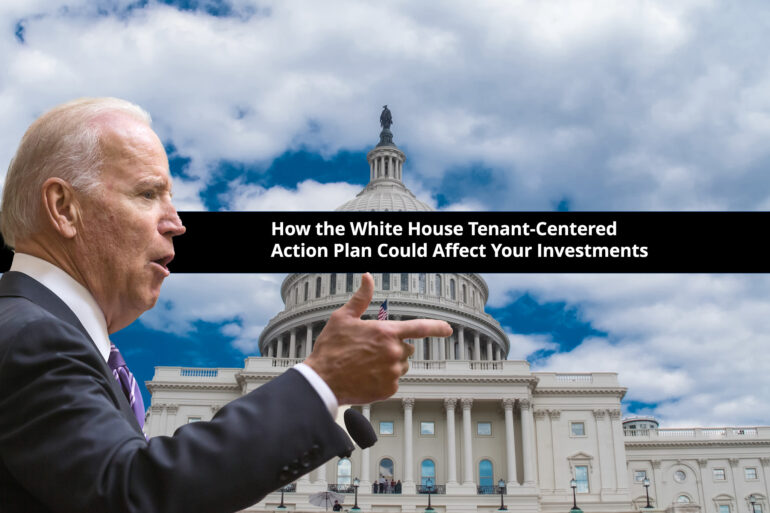How the White House Tenant-Centered Action Plan Could Affect Your Investments
The Biden Administration recently announced a new tenant-centered action plan to address affordable housing issues for renters. The project aims to provide support to struggling renters while supporting housing suppliers. Many expect these new policies to have a massive impact on the rental market, which is experiencing increasing rents due to rising inflation and a nationwide housing supply shortage. Real estate investors need to be aware of the potential impact of the new tenant-centered action plan to plan and prepare for how these policies might impact their portfolios.
The tenant-centered action plan has big and small investors paying attention to see if new policies will help or hurt their positions.
Rental Market Overview
The rental market in Florida and across the country has faced numerous challenges over the last couple of years, especially in terms of rental affordability. Inflation has taken a toll on several industries, making everything, including rent, more expensive. Strong demand for housing in areas with significant shortages also drives up prices. According to the National Association of Realtors (NAR), the lack of affordable housing supply is one of the most significant roots of our current challenges in the rental market.
The lack of affordable housing isn’t just a problem for renters. Real estate investors must also deal with challenges around their roles in housing. According to PEW Research, nearly seven in ten rental properties are owned by an individual or small company that only owns one or two properties. PEW’s research shows that landlords often struggle to meet their obligations as property owners, including paying mortgage payments, property taxes, and repair/maintenance bills due to a falloff in rental payments. The various eviction moratoriums didn’t help the situation, as many landlords didn’t receive rent payments for months or more. In NY, some landlords didn’t receive payments for up to 18 months.
According to a survey by the National Rental Home Council, nearly 23% of individuals who own less than three single-family homes plan to sell at least one of their properties due to the difficulty of collecting rent. As small real estate investors give up properties to make ends meet, larger investment firms and Real Estate Investment Groups (REIG) increase their market share.
More prominent investors are in a stronger position to deal with a loss in rent while sorting out rental situations, which can also lead to increased rental prices due to the competition of a housing shortage. Tricon Residential in Texas claims that they get over 5,000 calls per week to inquire about the 250 homes available at any time.
The tenant-centered action plan has big and small investors paying attention to see if new policies will help or hurt their positions.
Rental policies are heavily regulated at the state and local level, so we could be in for various legal battles to determine if the federal government can enforce new policies.
How the White House Is Approaching Rental Affordability
Biden’s tenant-centered action plan seeks to assist struggling tenants while supporting small investors who play a critical role in the nation’s housing supply. To achieve the goal of helping tenants, the white house released a Blueprint for Renters Bill of Rights.
TheBlueprint for Renters Rights includes five critical goals for renters:
- Safe and affordable housing
- Transparent and fair rental agreements
- Education, enforcement, and enhancement of tenant rights
- The right for tenants to organize.
- Eviction prevention and relief
The tenant-centered action plan has several other components:
- Information gathering by the Federal Trade Commission (FTC) and Consumer Financial Protection Bureau (CFPB). These organizations will look for unfair practices in the rental market, including practices that keep tenants from accessing or remaining in housing. They will look at background checks, tenant screening algorithms, adverse action notices, and how income influences housing decisions.
- The Federal Housing Finance Agency (FHFA) will launch an investigation into proposed actions promoting renter protection. The FHFA also plans to increase affordability in the multifamily rental market by encouraging friendlier financing options for buyers.
- The Department of Justice (DOJ) will investigate anti-competitive information sharing in rental markets.
- The U.S. Department of Housing and Urban Development (HUD) is proposing policies requiring at least 30 days advanced notice before terminating a lease due to nonpayment of rent for public housing projects.
- Tenant and advocacy groups will have access to quarterly meetings with the administration to continue sharing ideas to improve tenant protections.
While this ambitious approach to rental affordability has merits, some more considerable challenges might get in the way. For starters, rental policies are heavily regulated at the state and local level, so we could be in for various legal battles to determine if the federal government can enforce new policies. There’s also the question of who these policies might help and who could potentially be harmed.
A change in how landlords consider credit scores in applications could produce a more fair system for those who lack credit to obtain housing. It could also lead to riskier rentals.
Potential Impact on Real Estate Investors
NAR has concerns that federally-enacted policies might drive housing providers out of the market, which could significantly impact housing affordability. With fewer players in the game, increased competition will likely lead to higher rental prices. Some are concerned that allowing the government to dictate too many rental policies will create a more significant undue burden on smaller-scale investors and property owners.
On the other hand, the administration’s focus on helping with rental assistance to avoid evictions could help smaller-scale investors. These property owners will get their rental payments, meaning they can cover their expenses. The assurance that rent will be paid can open the doors to more affordable housing options for needy people. HUD, along with other programs, already helps property owners offer reduced rents to low-income tenants; expanding these programs could benefit renters and landlords alike. For example, the Florida Homeowner Assistance Fund has assisted over 26,000 home and property owners with over 518 million dollars since the inception of the American Rescue Plan Act of 2021.
Larger investment groups may not see the number of rental properties for sale if small-scale investors aren’t forced to liquidate their assets. These larger groups may also see a slow rental price rise as competition spreads across various property owners and investors.
One final area that could impact property owners, regardless of the number of properties they own, is the focus on using alternative credit scores for applications. Instead of using a traditional credit score to determine an applicant’s eligibility, landlords would have to consider other scoring sources that often favor applicants. Using alternative credit scores isn’t entirely new, as many landlords already use programs like VantageScore. FICO, the most traditional credit score supplier, requires that consumers have at least six months of credit history to generate a score. VantageScore can produce a score for those with at least one credit account, regardless of age. This system is often ideal for those renting apartments to college students who are less likely to have a long credit history.
A change in how landlords consider credit scores in applications could produce a more fair system for those who lack credit to obtain housing. It could also lead to riskier rentals. Property owners will want to look at how they currently select tenants and consider changes in their lease agreements to ensure they don’t take unnecessary risks.
Real estate investors should start planning to ensure they can make the most of any changes.
Moving Forward
While the White House’s tenant-centered action plan hopes to take some bold moves toward increasing affordable housing and protecting renters, its impact might affect how property owners approach rentals. The Blueprint for Renters’ Rights and the tenant-centered action plan are both in the early stages. It’s impossible to say precisely if and how these programs will be implemented in state- and locally-controlled rental markets. Still, real estate investors should start planning to ensure they can make the most of any changes.
For smaller mom-and-pop investors, new policies could help relieve the burden of tenants’ inability to afford rent due to rising costs everywhere else in their lives. Less risk in affordable housing could lead to more options for families and landlords. On the other side, these policies could also lead to housing supplies leaving the market, thus reducing the number of available units in the housing market that already has a shortage.
The impact and information gathered from the tenant-centered action plan will be closely monitored in the coming months to ensure property owners and investors can plan accordingly.








